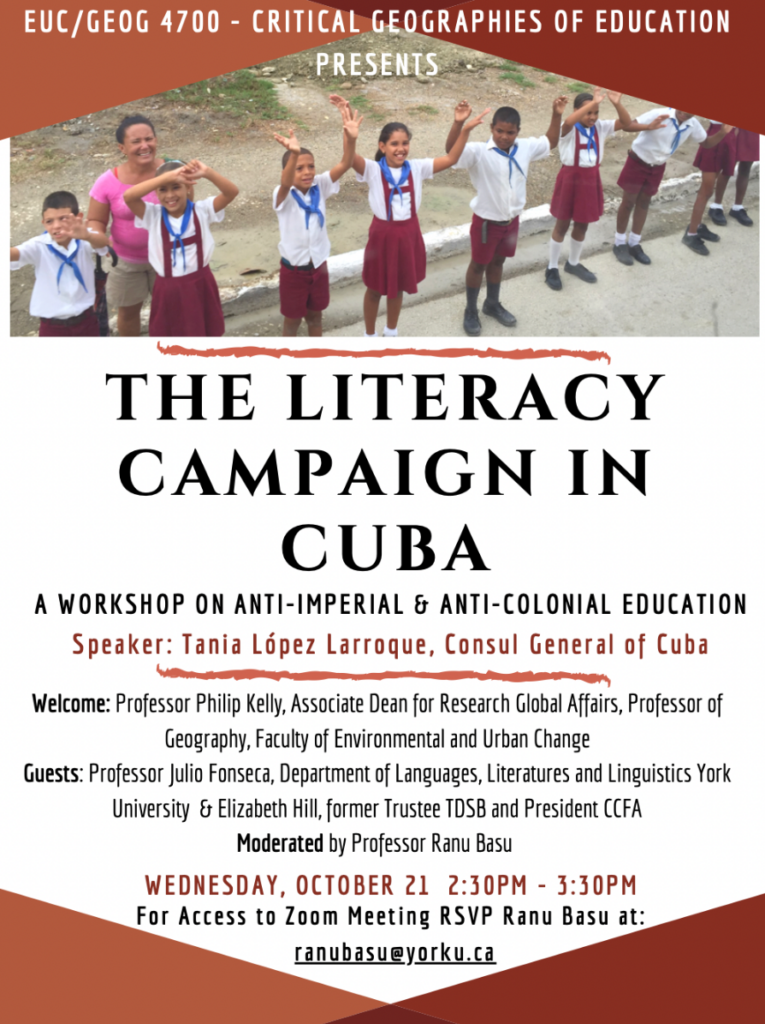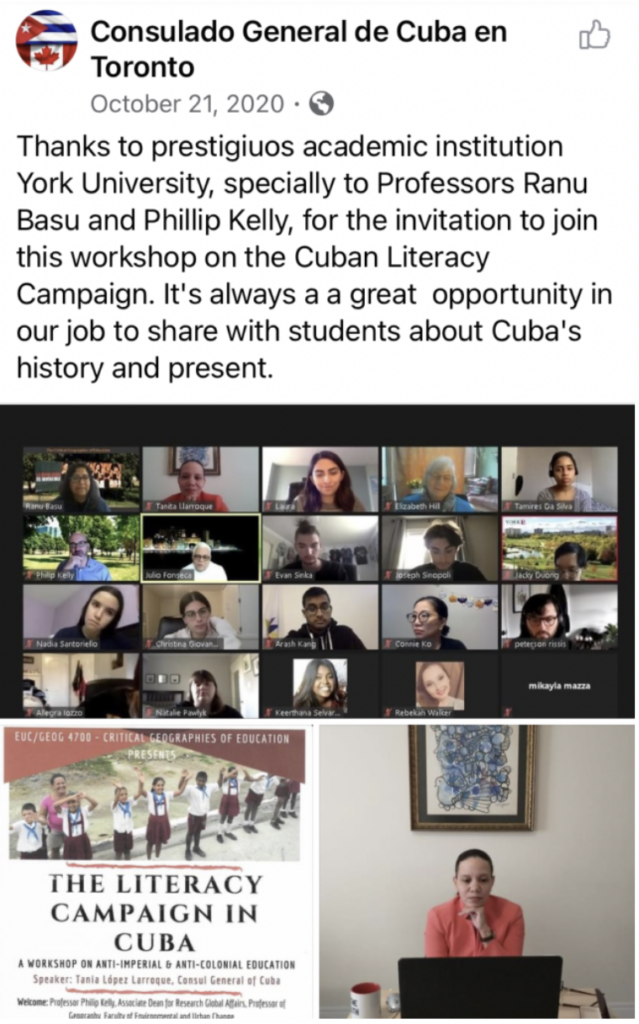
Cuban Women: Politics, Culture and Revolution - Journal Launch
Guest edited by: Ranu Basu, Brenda Cranney, Azza Rojbi, Vilma Paez, Claudia Peralta, Ana Isla, Elianis Paez Concepcion and Lisa Makarchuk
This special double issue of Canadian Woman Studies/les cahiers de la femme (CWS/cf) focuses on the unique role of Cuban women in the revolutionary process, their struggles for rights and emancipation, as well as celebrating their many accomplishments and successes through radical art, culture, and literary works. Cuban women have been involved in revolutionary movements since the early 1800s. Examples of these progressive women include: Carlota Lucumí, Rosa Castellanos, Ana Betancourt, Asela de los Santos Tamayo, Haydée Santamaría Cuadrado, Vilma Espín, Celia Sánchez, Aleida March.
Writing and art in Cuba are forms of political activism, as seen in pre-revolution writing when many writers were responding to the political situation and their work is shaped by this. Early writers included Gertrudis Gómez de Avellaneda, an abolitionist writer and Úrsula Céspedes, a Cuban poet. After the abolition of slavery in Cuba in 1886, the focus of Cuban literature shifted to themes of independence, freedom, and social protest. Writers during this period included Aurelia Castillo de González, Ofelia de la Concepción Rodríguez Acosta García, and Ofelia Domínguez Navarro, a Cuban writer, teacher, lawyer, feminist, and activist.
Fidel Castro described women as “the revolution within the revolution.” After 1959, and the triumph of the revolution, the status of Cuban women improved. Women are well represented in politics and important decision-making bodies, science and technology, art and culture. Official policies resulted in “so-called” formal and legal gender equality. In a patriarchal and machismo society, change can be slow and complicated. Gender inequalities and gender stereotypes are difficult to change. While the status of Cuban women has improved, spurred on with the implementation of the new family code in 2022, women continue to advocate for further change. The rise of feminism and feminist organizations in Cuba reflects this.

Canadian Association for Refugee and Forced Migration Studies (CARFM) and Congress of the Humanities and Social Sciences, York University 2023
The proposed sessions aims to facilitate a productive engagement on the ‘Geopolitics of Education for Peace’ (GEP) as a collaborative mode of enquiry examining the territorial linkages between the production of knowledge, culture of peace, and imperial-colonial contingencies related to questions of migration and mobility. The disruptive forces of ongoing wars, violence, territorial conflict or environmental disasters that prolong the historical impacts of subalterity through geopolitical displacement—whether through forced migration, internal displacement, exile, or sanctions/blockades—continue brazenly unabated while the hardships and suffering of masses displaced unfold in the material contingencies of everyday life. In the midst of such daily struggles and hardships, the active quest for imagining, pursuing and sustaining cultures of peace and protection in opposition to hegemonies of power - either through State or civil society initiatives, requires what Gramsci refers to as a ‘philosophy of praxis’.
The panelists will explore ‘Geopolitics of Education for Peace’ as both theory and praxis sharing their work on a range of innovative case studies from Cuba, India, Canada and beyond. These include cooperative movements, urban school initiatives, environmental movements, that reflect the creative endeavours of local communities in their determined efforts of building and sustaining communities of peace and protection. Further, drawing from anti-colonial and anti-imperial intellectual thought across continents (i.e. Marti, Tagore, Fanon, Spivak) in further developing GEP, the sessions will advance academic debates on building international solidarity strategies towards sustainable peace, protection, and rights to sovereignty.
View Todos Los Niños Del Mundo (All the Children of the World), a song written by Cuban singer, Tania Castellanos (1920-1988), performed by the chorus Lucecita (little light), a community project for children in Cuba bringing them closer to different manifestations of art. This video was recorded and presented to CARFM and CRS at Congress 2023, and played at the opening plenary of CARFM.

Session: Geopolitics of Education for Peace: Part I
University of Havana, FLACSO and York University, EUC, CRS
Ways to Promote Education for Peace in Schools in the City of Havana
Luisa Iñiguez Rojas
Educating for Peace in the 21st century: A Look at Pedagogical Practice in Cuban Primary Schools
Anette Jiménez Marata
Re-defining Youth in Development: The Experiences of Grenadian Youth in Second-Chance Education Organizations
Laura Perez Gonzalez
Community Participation through Neighbourhood Soccer and its Contribution to the Reconstruction of the Social Fabric in Chile
Patricio Quevedo
Community-led Responses to Education Inequality in a Brazilian Necropolis: Empowerment and Peacebuilding through Popular Education
Tamires Da Silva
Session: Geopolitics of Education for Peace: Part II
University of Havana, FLACSO and York University, EUC, CRS
Cuban Cooperatives in the Construction of Education for Peace and Conflict Resolution
Reynaldo Jiménez Guethón
Exploring the Role of Gender Responsive Policymaking in Mitigating the Impact of COVID-19 on Women: The Case of Kudumbashree, Kerala
Aysha Shamsuddin
Environmental Education for Climate Change and Disaster Risk Reduction for Peace in Cuba
Marta Muñoz Campos
Economic War on Cuba and Emigration
Julio Fonseca
The 'Geopolitics of Education for Peace': Anti-colonial Perspectives Linking Havana, Kolkata and Tkoronto
Ranu Basu

A workshop on the broader discussions on anti-imperialism and anti-colonial education was held on October 21st, 2020 at York University with students of EUC/GEOG 4700. The workshop focused on the Cuban Literacy Campaign, with a guest keynote speaker, the Consul General of Cuba in Toronto. Guests also included York University Professor Phillip Kelly, Associate Dean for Research Global Affairs, Professor Julio Fonseca, Department of Languages, Literatures and Linguistics, and Elizabeth Hill, former trustee of the Toronto District School Board.
The workshop created opportunities for discussion on the neoliberalization of education with a comparison between education in Ontario and the case of Cuba and success of the Literacy Campaign. Students led questions on the topic of education and COVID-19, highlighting the importance of education as spaces of community.

